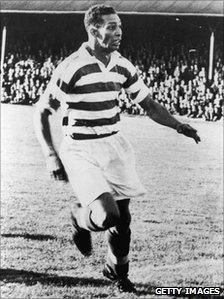Gil Scott-Heron: US musician and poet in profile
- Published
- comments
When Gil Scott-Heron re-emerged a few years ago from a long period of musical exile, his acclaimed new album led to a reappraisal of his work and influence.
As he turned 60, the American author, poet, and musician was once again thrust into the public eye as he released his solo recording, I'm New Here, and follow-up remix album.
Remembered for his poetry set to melodic jazz and soulful protest songs in the 1960s and 70s, he was an unmistakable influence on an emerging generation of rappers and hip hop artists.
Yet he was quick to reject some of the more grandiose epithets such as the "Godfather of rap" and "the black Bob Dylan".
'Fierce intelligence'
It was typical of the discerning, lanky artist who shunned the limelight.
"He had a fierce intelligence and a way with words which was untouchable; an incredible sense of humour and a gentleness and humanity that was unique to him," said Richard Russell, the head of XL Records who signed him and produced his last album.

The artist's father, Gil Heron, was known as "the Black Arrow" at Celtic
"Gil shunned all the trappings of fame and success. He could have had all those things. But he was greater than that. He seemed wholly uninterested in money."
Born in 1949, Scott-Heron was the son of a Jamaican footballer who was the first black man to play for Glasgow Celtic.
He was raised by his mother and grandmother in Jackson, Tennessee, where he discovered the verse of the black poet Langston Hughes whilst at college - an obvious early influence.
In an interview with BBC 6 Music last year, Scott-Heron recalled: "My grandmother bought a piano for about $8, I think it was. I began to listen to the radio and try to pick out what they were playing by ear.
"There were a lot of blues progressions that I was able to give some life to on the piano, there, and I enjoyed it very much."
In 1968, aged 19, he wrote his most famous work, The Revolution Will Not Be Televised, a satirical spoken-word piece released on Small Talk at 125th by a small label two years later.
A kind of oral blog from the projects, it became a phrase which would enter the language and lead on to pop music about the inequities of apartheid.
Other songs addressed poverty and racism as well as contemporary issues such as nuclear power (We Almost Lost Detroit) and celebrity (Show Bizness).
By 23, he had published two novels and a book of poems and recorded three albums.
He also successfully campaigned alongside fellow artists Stevie Wonder and Bob Marley for a US public holiday to be named in honour of civil rights campaigner Martin Luther King.
Public Enemy's Chuck D said: "Gil Scott-Heron was one of the foundations that rappers could perform themselves off of.
"I think a lot of it happened with the word, the meaning and the definition - or the redefinition - of the words he used, but also the pacing.
"Mr Heron delivered his words with a feeling and with a rhythm that was a great basis for rap. It was a fundamental start for rap to trigger itself from."
Scott-Heron's repertoire included tracks about addiction such as Down Some Dead-end Street There Ain't No Turning Back and The Bottle, which mirrored his own struggle.
In 2001, he was jailed in New York State for cocaine possession and in 2006 for violating a plea deal on a drug-possession charge by leaving a rehabilitation clinic.
It was while he was doing time that Scott-Heron received a visit from Richard Russell, who guided him into the studio for his comeback album.
Russell said in a tribute on his blog: "To my knowledge he never accepted an award. He always wanted everyone else to receive credit for their work.
"He is the only artist I've ever worked with who requested that the studio engineer's photo be given equal prominence to his own on his website.
"Gil meant a massive amount to me, as he did to so many people. His talent was immense. He was a master lyricist, singer, orator, and keyboard player.
"His spirit was immense. He channeled something that people derived huge benefit from."
- Published28 May 2011